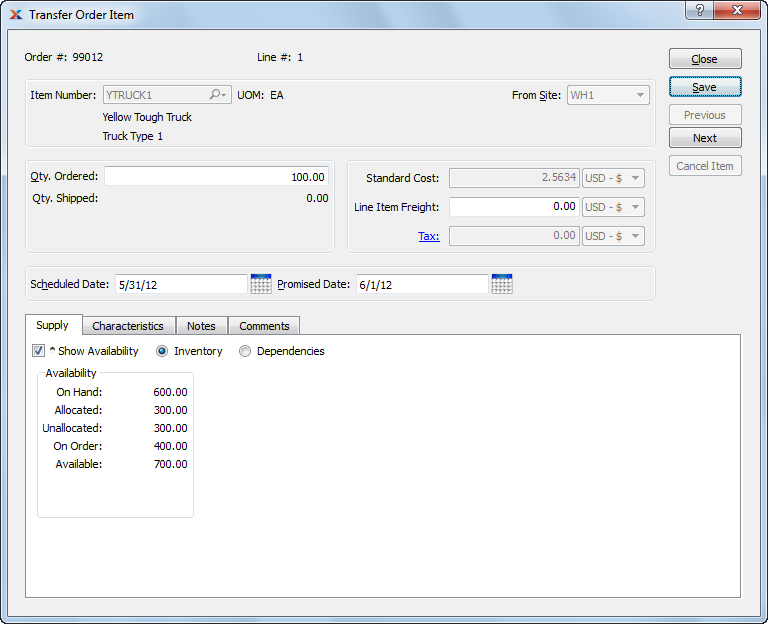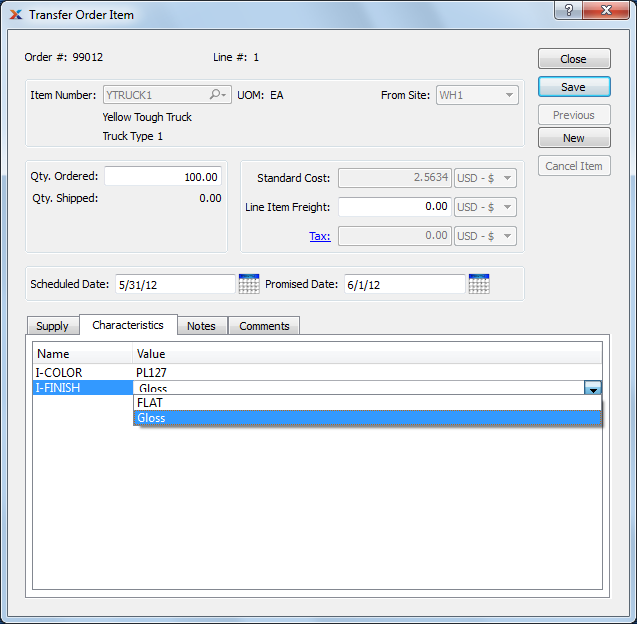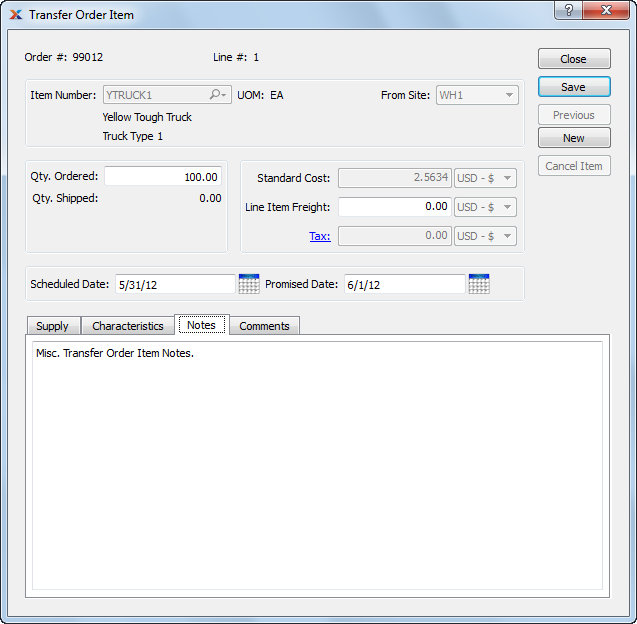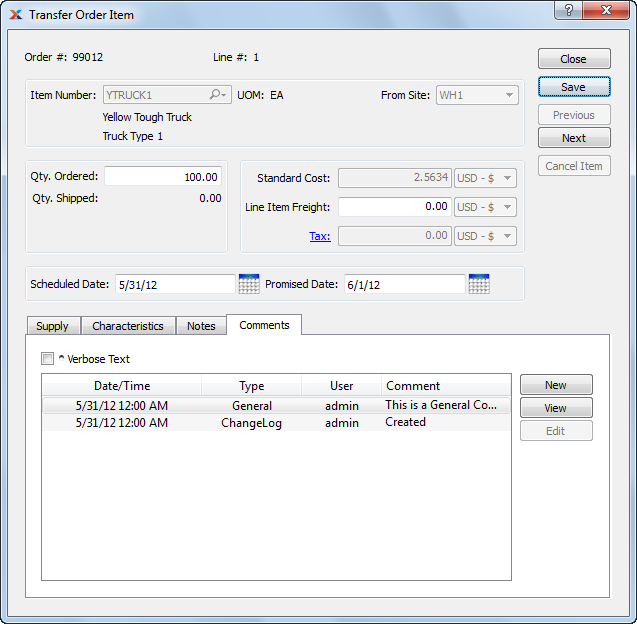
|
xTuple ERP Reference Guide |
To add a new transfer order line item, select the button. The following screen will appear:

When creating a new transfer order line item, you are presented with the following options:
Displays the transfer order number specified on the Transfer Order header screen.
Displays the line item number for the current line item.
Enter the item number of the item you want to sell. The item list will contain items having valid item sites in the from (i.e., source) site.
Because kit items are non-stock items, they may not be added to transfer orders.
Displays the source site specified on the Transfer Order header screen.
Enter the quantity of the specified item to be transferred.
Shipped to date: Displays the total quantity shipped of the specified line item to date.
Displays the standard cost per unit.
Enter the amount of freight charges for the entire line item quantity.
Displays the amount of tax to be charged for the transfer order line item quantity. Sales tax is calculated at the transfer order line item level. To get a detailed view of the tax calculation, click on the link using your mouse.
The scheduled date is the date when the line item should be shipped. The user who enters the line item is responsible for determining the scheduled date. After entering the scheduled date, hit the key on your keyboard to display values in the remaining display only fields.
The transfer order item having the earliest scheduled date will determine the ship date for the transfer order.
An additional informational date that can be used for a user defined purpose.
The following buttons are unique to this screen:
Select to view previous line items associated with the transfer order.
Select to cancel the current transfer order line item. Records of canceled line items will be retained for informational purposes. To view canceled line items associated with a transfer order, select the Show Canceled Line Items option on the Transfer Order header's tab.
If there is no item site for the item in the destination site, you will automatically be presented with an Item Site screen. Simply enter the required information to create an item site in the destination site. An item site must exist in the destination site before material can be received successfully.
Select to display availability supply information for the transfer order item in the following categories:
Select option to view available inventory.
Displays the current quantity on hand (QOH) value.
Displays the quantity allocated to current sales orders, transfer orders, and/or work orders in the system. An item is considered allocated to a sales order/transfer order if a transfer order line item exists for the item—and that line item has not yet been issued to shipping. An item is considered allocated to a work order if the item is a material requirement—and the material has not yet been issued to the work order. Once the current transfer order line item is saved, the Allocated value will increase by the quantity ordered.
Displays the QOH remaining after allocations have been accounted for, as in:
QOH - Allocated Qty. = Unallocated Qty.
If the transfer order item is a manufactured item, the quantity ordered by current work orders will be displayed. If the transfer order item is a purchased item, the quantity ordered by current purchase orders will be displayed.
Displays the available quantity. Available quantity is determined using the following formula:
Unallocated Qty. + On Order Qty. = Available Qty.
Select option to review any components dependent on manufactured line item.
Displays components items associated with sold manufactured item in a nested list with a plus () sign located to the far left of the screen next to each line that may be expanded to lower levels. By clicking your mouse on a plus sign, you reveal lower levels of information related to the line item.
When selecting or editing characteristics for a transfer order line item, you are presented with the following options:

Displays the name of any item characteristics associated with the item. Characteristics defined as item characteristics may be associated with items on the Item master.
Displays the default value associated with an item characteristic, but permits you to specify an alternate value. When associating characteristic values with a transfer order line item, you have four options: 1) Select the default value; 2) select an alternate pre-defined value from the list; 3) manually enter a new value in place of the pre-defined value; or 4) make no selection. Making no selection means the characteristics will not be associated with the transfer order line item.
You can link characteristics and values to an item by using the Item master. Once entered, these characteristics and values will be available to users entering transfer order line items.
To enter notes related to a transfer order line item, select the tab at the bottom of the screen, as shown below:

When adding notes to a transfer order line item, you are presented with the following options:
This is a scrolling text field with word-wrapping for entering general notes related to the transfer order line item.
To add comments related to a transfer order line item, select the tab. The following screen will appear:

Whenever transfer order line items are created or their quantities are changed, the system will automatically generate a comment, which will appear in the list of line item comments.
When adding or reviewing comments, you are presented with the following options:
Select to display all comments in the list in an expanded view which includes the entire text of each comment. To edit a comment, simply select the link next to the comment. That link will not be shown for changelog comments, which can't be edited. If the Verbose Text option is not selected, the comment list will display only header level information for each comment.
Display lists comments related to the record.
The following buttons are available:
Opens screen for creating a new comment.
Highlight a comment and then select this button to reach a read-only view of the Edit screen.
Enables you to edit highlighted comments—as long as the comments are not changelog comments. ChangeLog comments are system-generated and may not be edited. The Edit screen is the same as that for creating a new comment—except that when editing, the fields will contain comment information. Double-clicking on a comment will also bring you to the editing screen.
To enter a new comment, select the button. The following screen will appear:

Select a comment type from the drop-down list to classify the comment. This is a required step. Comment types may be system-defined (i.e., changelog and general) or user-defined, as described in Section 13.2.3, “Comment Types”. Once you have specified a comment type, begin typing your comment in the main text area. The text area features word-wrapping and scroll-bar support for longer comments.
The following buttons are unique to this screen:
Select to show the complete list (i.e., thread) of comments associated with the record. To hide the list, simply select the button again. The comment thread will show the most recent comment first.